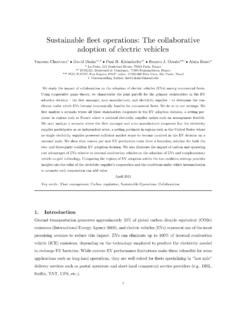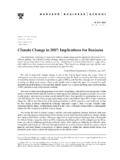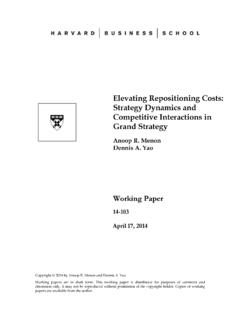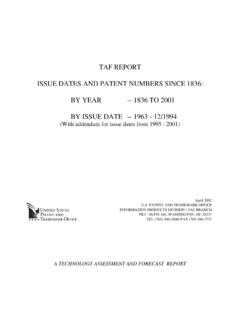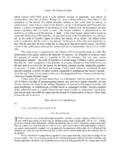Transcription of Entrepreneurship and Business History: Renewing the ...
1 07-007 Copyright 2006 by Geoffrey Jones and R. Daniel Wadhwani Working papers are in draft form. This working paper is distributed for purposes of comment and discussion only. It may not be reproduced without permission of the copyright holder. Copies of working papers are available from the author. Entrepreneurship and Business History: Renewing the Research Agenda Geoffrey Jones R. Daniel Wadhwani 1 Entrepreneurship and Business History: Renewing the Research Agenda Geoffrey Jones Joseph C. Wilson Professor of Business Administration Harvard Business School R. Daniel Wadhwani Assistant Professor of Management and Fletcher Jones Professor of Entrepreneurship University of the Pacific 2 Entrepreneurship and Business History: Renewing the Research Agenda During the 1940s and 1950s Business historians pioneered the study of Entrepreneurship .
2 The interdisciplinary Center for Research on Entrepreneurial History, based at Harvard Business School which included Joseph Schumpeter and Alfred Chandler, and its journal Explorations in Entrepreneurial History were key institutional drivers of the research agenda. However the study of Entrepreneurship ran into formidable methodological roadblocks, and attention shifted to the corporation, leaving the study of Entrepreneurship fragmented and marginal. Nevertheless Business historians have made significant contributions to the study of Entrepreneurship through their diverse coverage of countries, regions and industries, and in contrast to much management research over the past two decades - through exploring how the economic, social, organizational, and institutional context matters to evaluating Entrepreneurship .
3 This working paper suggests that there are now exciting opportunities for Renewing the research agenda on Entrepreneurship , building on the strong roots already in place, and benefiting from engaging with advances made in the study of entrepreneurial behavior and cognition. There are opportunities for advancing understanding on the historical role of culture and values on entrepreneurial behavior, using more careful methodologies than in the past, and seeking to specify more exactly how important culture is relative to other variables. There are also major opportunities to complement research on the role of institutions in economic growth by exploring the precise relationship between institutions and entrepreneurs.
4 3 Entrepreneurship and Business History: Renewing the Research Agenda Geoffrey Jones and R. Daniel Wadhwani 1. Entrepreneurship and Business History since the 1980s, Entrepreneurship has emerged as a topic of growing interest among management scholars and social scientists. The subject has grown in legitimacy, particularly in Business schools (Cooper 2005). This scholarly interest has been spurred by a set of recent developments in the United States: the vitality of start-up firms in high technology industries, the expansion of venture capital financing, and the successes of regional clusters, notably Silicon Valley. Motivated by the goal of understanding these developments, management scholars and social scientists interested in Entrepreneurship have tended to focus their attention on studying new Business formation, which provides a homogeneous and easily delimited basis for quantitative empirical work (Thornton 1999; Aldrich 1999, 2005; Gartner and Carter 2005).
5 These studies commonly use large datasets of founders or firms and employ rigorous social science methodologies, but give little analytical attention to the temporal or geographical context for entrepreneurial behavior. In contrast, historical research on Entrepreneurship started much earlier, and traces its roots to different motivations and theoretical concerns. The historical study of Entrepreneurship has been particularly concerned with understanding the process of structural change and development within economies. Business historians have focused on understanding the underlying character and causes of the historical transformation of businesses, industries and economies. This historical research has typically employed a 4 Schumpeterian definition of Entrepreneurship .
6 Unlike the recent management scholarship, it has not focused primarily on new firm formation, but rather on the varying forms that innovative activity has taken and on the role of innovative Entrepreneurship in driving changes in the historical context of Business , industry, and the economy. This working paper begins by providing a brief introduction to the origins and evolution of historical research on Entrepreneurship . It then turns to explore a series of different streams of Business history research that deal with issues of Entrepreneurship and historical change. These sections highlight the ways in which historical context shaped the structure of entrepreneurial activity and how new economic opportunities were pursued, and reveal the wide variation in organizational form and entrepreneurial behavior that historians have found.
7 The working paper concludes by discussing the main contributions of Business history to the study of Entrepreneurship , and proposes a renewed research agenda. This paper does not seek to offer a comprehensive survey of all areas of Business history which consider Entrepreneurship . However it should be emphasized that the extensive literatures on gender (Kowlek-Folland 1998; Goldin 1990), industrial districts (Sabel and Zeitlin 1997), family Business (Colli 2003), and globalization (Jones 2005a), among others, have much to say about Entrepreneurship . 2. Origins and Motivation The concept of Entrepreneurship played a formative role in the emergence of Business history as a distinct academic field.
8 since the middle of the nineteenth century, economic historians had critiqued the static theories of classical and neoclassical economic 5thought by documenting the ways in which the structure of economies had changed over historical time. This early historicism emphasized the ways in which the institutions of capitalism and industrialism evolved (Hodgson 2001). By the early twentieth century, however, a number of historians and historical sociologists had moved beyond the institutional perspective to emphasize the mentality and agency of entrepreneurs in the process of economic change. German historical sociologists explored the role of religion and social relations in the development of modern capitalist attitudes toward economic gain and economic opportunity (Weber 1904, English translation 1930; Simmel 1908, English translation 1950; Sombart 1911).
9 By the middle decades of the century economic and Business historians were very engaged in researching the careers of influential eighteenth-century entrepreneurs as a way of understanding the causes of the Industrial Revolution (Ashton 1939; Wilson 1955; McKendrik 1959, 1964). These studies focused attention on the creative agency and subjectivity of individuals in the process of economic change. This growing attention to entrepreneurs as agents of historical change was bolstered by the theoretical work of Joseph Schumpeter. The Austrian economist s ideas helped establish Entrepreneurship as a substantive area of historical research and deepened the significance of the Business historians endeavors by linking Entrepreneurship to a theory of economic change.
10 Schumpeter argued that the essence of entrepreneurial activity lay in the creation of new combinations that disrupted the competitive equilibrium of existing markets, products, processes and organizations (Schumpeter 1947). The creation of such new combinations, he elaborated, was a constant source of change within markets, industries, and national economies. It underlay the creative destruction that replaced old 6forms of economic transaction with new forms in capitalist economies (Schumpeter 1942). In the decade leading up to his death in 1950, Schumpeter repeatedly stressed that the empirical study of Entrepreneurship was an inherently historical endeavor because the phenomenon was best understood in retrospect as a critical element in the process of industrial and economic change.
